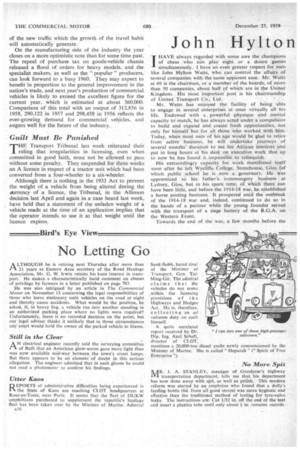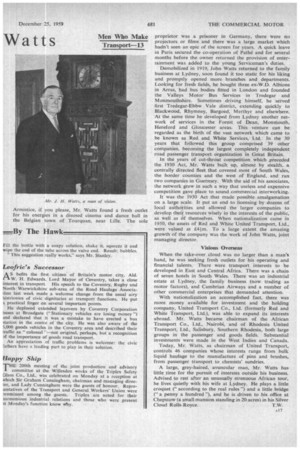No Letting Go
Page 18

Page 19

If you've noticed an error in this article please click here to report it so we can fix it.
ALTHOUGH he is retiring next Thursday after more than 21 years as Eastern Area secretary of the Road Haulage Association, Mr. G. N. Irwin retains his keen interest in transport. He n-takei a characteristically lucid comment on abuses of privilege by farmers in a letter published on page 703.
He was also intrigued by an article in The Commercial Motor on November 13 concerning the legal responsibilities of those who leave stationary unlit vehicles on the road at night and thereby cause accidents. What would be the position, he asked, if, in heavy fog, a vehicle ran into another standing in an authorized parking place where no lights were required? Unfortunately, there is no recorded decision on the point, but our legal adviser thinks it unlikely thatin those circumstances any court would hold the owner of the parked vehicle to blame.
Still in, the Clear
AN electrical engineer recently told the surveying committee of Bath that an American glow-worm gave more light than was now available mid-way between the town's street tamps. Rut there appears to be an element of doubt in this serious allegation. The engineer admitted that in such gloom he could not read a photometer to confirm his findings.
Utter Kaos
REPORTS of administrative difficulties being experienced in the State of Kaos are reaching CLOT headquarters at Rose-en-Toste, near Paris. It seems that the fleet of DUKW amphibians purchased to supplement the republic's haulage fleet has been taken over by the Minister of Marine. Admiral
Al 41
Sunk-Subh, hated rival of the Minister of Transport, Gen. TaiMing-Gir, The admiral claims that the vehicles do not come. within the licensing provisions of the Highways and Hedges Act. He is, therefore. collecting an ad valorem duty on each himself.
A quite unrelated report received by Dr. Dip. Ing. Axel Schaft, director of CLOT, mentions a 20,000-ton diesel yacht newly commissioned by the Minister of Marine. She is called "Heparah ("Spirit of Free Enterprise ").
"I ran into one of those high-pressure salesmen."
No More Spit
Tuft. I. A. STANLEY, manager of Goodyear's highway rifl transportation department, tells me that his department has now done away with spit, as well as polish. This modern reform was started by an employee who found that a dolly's feeding bottle (6d. from all good stores) was more hygienic and effective than the traditional method of testing for tyre-valve leaks. The instructions are: Cut 1/32 in. off the end of the teat and insert a plastics tube until only about 4. in. remains muside
Fill the bottle with a soapy solution, shake it, squeeze it and wipe the end of the tube across the valve end. Result: bubbles. "This suggestion really works," says Mr. Stanley.
Leofric's Successor
AS befits the first citizen' of Britain's motor city, Aid. W. H. Edwards, Lord Mayor of Coventry, takes a close interest in transport. His speech to the Coventry, Rugby and North Warwickshire sub-area of the Road Haulage Association last week made a welcome change from the usual airy histrionics of civic dignitaries at transport functions. He put a practical finger on several important points.
He deplored extended layovers by Coventry Corporation buses at Broadgate ("Stationary vehicles are losing money ") and declared that it was a mistake to have erected a bus Station in the centre of the city. He was also aware of• the 5,000 goods vehicles in the Coventry area and described their traffic as "colossal "—not original, perhaps, but a recognition A the importance of goods road transport.
An appreciation of traffic problems is welcome: the civic Eathers have a leading part to play in their solution.
Happy Ship
THE 200th meeting of the joint production and advisory committee at the Willesden works of the Triplex Safety Glass Co., Ltd., was celebrated on Monday at a reception at which Sir Graham Cunningham, chairman and managing director, and Lady Cunningham were the guests of honour. Repre ■ entatives of the Transport and General Workers' Union were 3rominent among the guests. Triplex are noted for their larmonious industrial relations and those who were present at Monday's function know why.
















































































